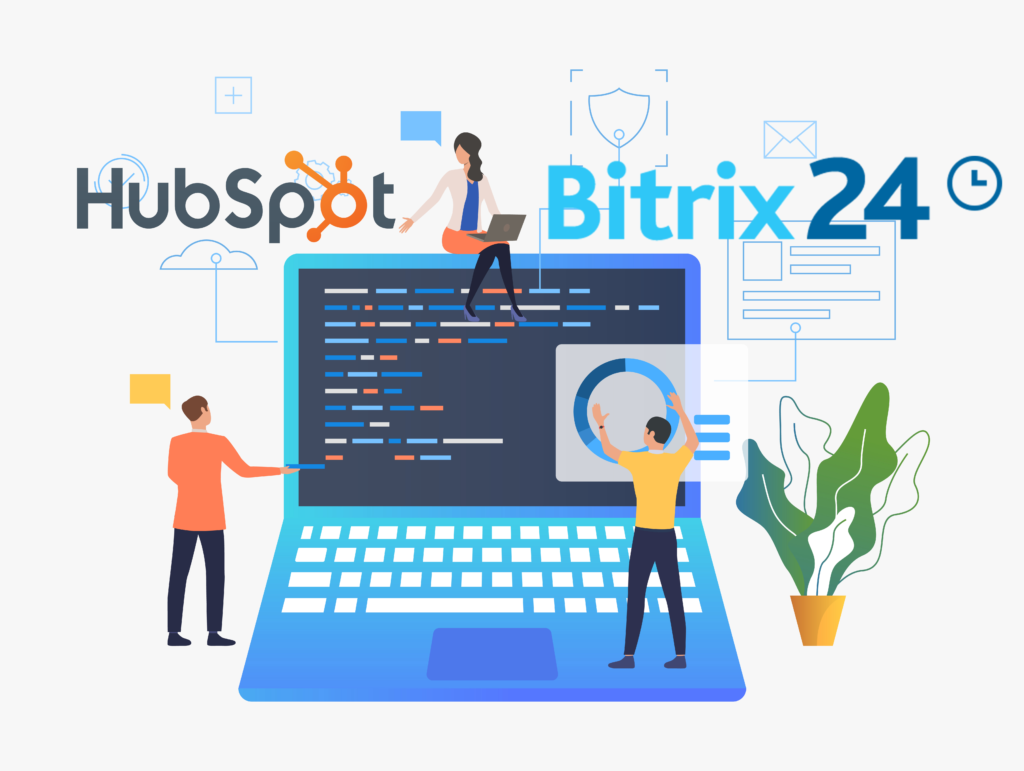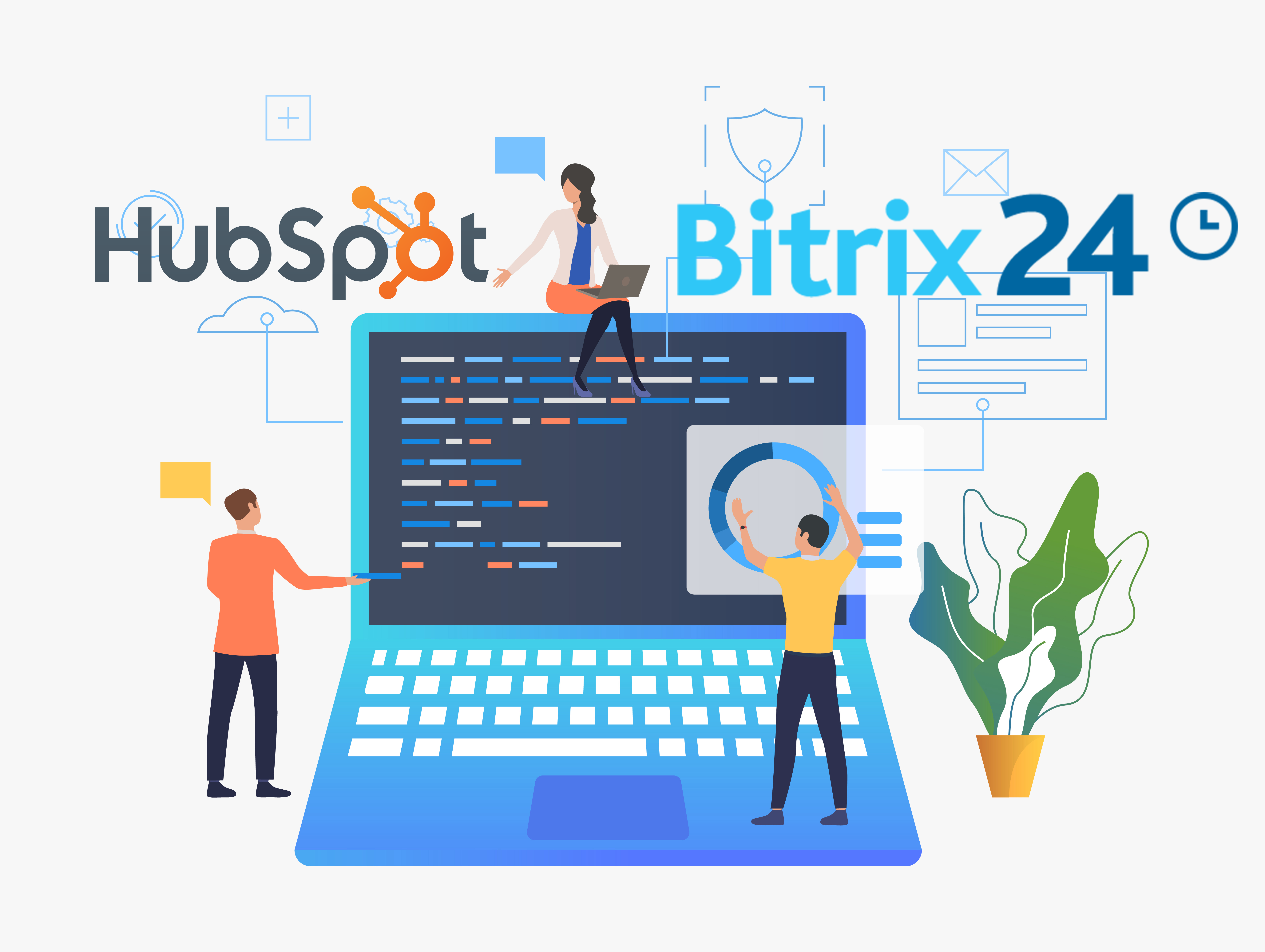Choosing the right CRM for your business can be a daunting task, especially with so many options available in the market. Two of the most popular CRM software solutions are HubSpot and Bitrix24. In this article, we will compare these two platforms and help you decide which one is best for your business needs. HubSpot and Bitrix24 are two popular customer relationship management (CRM) platforms that offer a range of features to help businesses manage their customer interactions and improve their sales processes. While both platforms have some similarities, there are also some key differences between them that businesses should consider when choosing between them. Here’s a comparison of HubSpot vs Bitrix24:

HubSpot: Overview
HubSpot is a well-known CRM software that offers a range of marketing, sales, and service tools to help businesses grow. It has a user-friendly interface and is suitable for both small and large businesses.
Key Features:
Marketing Hub: HubSpot’s Marketing Hub provides tools for creating and managing email campaigns, social media, landing pages, and blogs. It also offers SEO optimization, analytics, and lead generation tools.
Sales Hub: HubSpot’s Sales Hub offers tools for managing leads, deals, and contacts. It also provides email tracking, meeting scheduling, and sales automation features.
Service Hub: HubSpot’s Service Hub provides tools for managing customer support, tickets, and feedback. It also offers a knowledge base, chatbots, and customer feedback surveys.
CRM: HubSpot’s CRM is free and provides basic contact management, deal tracking, and sales pipeline management features. It integrates with HubSpot’s marketing, sales, and service tools, making it a comprehensive solution for managing customer interactions.
Pros:
HubSpot offers a range of tools for marketing, sales, and service management, making it a comprehensive solution for businesses.
HubSpot’s user-friendly interface and intuitive design make it easy to use.
HubSpot’s free CRM is a great option for small businesses looking to get started with CRM software.
HubSpot integrates with a range of third-party tools, making it easy to customize and expand.
Cons:
HubSpot can be expensive, especially for businesses that require advanced features.
HubSpot’s pricing structure can be confusing, with different plans offering different features.
HubSpot’s customer support can be slow to respond to queries.
Bitrix24: Overview
Bitrix24 is a CRM software that offers a range of collaboration, communication, and management tools for businesses. It has a user-friendly interface and is suitable for both small and large businesses.
Key Features:
Collaboration: Bitrix24 offers a range of collaboration tools, including project management, team communication, and document management.
Sales Automation: Bitrix24’s sales automation tools provide lead management, email marketing, and contact management features. It also offers invoice management and online payment options.
Customer Support: Bitrix24’s customer support tools include a helpdesk, knowledge base, and customer feedback surveys.
CRM: Bitrix24’s CRM provides basic contact management, deal tracking, and sales pipeline management features. It also offers sales automation tools, making it a comprehensive solution for managing customer interactions.
Pros:
Bitrix24 offers a range of collaboration and management tools, making it a comprehensive solution for businesses.
Bitrix24’s user-friendly interface and intuitive design make it easy to use.
Bitrix24’s pricing structure is transparent, with different plans offering different features.
Bitrix24 integrates with a range of third-party tools, making it easy to customize and expand.
Cons:
Bitrix24’s customer support can be slow to respond to queries.
Bitrix24’s free plan has limited features, making it unsuitable for businesses with complex requirements.
Bitrix24 can be expensive for businesses that require advanced features
HubSpot vs Bitrix24: Comparison
HubSpot vs Bitrix24 Pricing:
HubSpot offers a range of pricing plans, starting with a free plan that includes basic features such as lead capture forms, contact management, and email marketing. Paid plans start at $45 per month and go up to $3,200 per month, depending on the features and number of contacts. Bitrix24, on the other hand, offers a free plan with limited features, as well as paid plans starting at $19 per month and going up to $159 per month for more advanced features.
HubSpot vs Bitrix24 Features:
Both HubSpot and Bitrix24 offer a range of features, including contact management, email marketing, task management, and reporting. However, HubSpot also includes features such as marketing automation, landing pages, and social media management, which are not included in Bitrix24. Bitrix24, on the other hand, includes features such as telephony, CRM marketing, and video conferencing, which are not available in HubSpot.
HubSpot vs Bitrix24 User interface:
HubSpot has a user-friendly interface that is easy to navigate, with drag-and-drop functionality and customizable dashboards. Bitrix24, on the other hand, has a more complex interface with more options and settings. While this can be overwhelming for some users, it also allows for more customization and flexibility in how the platform is used.
HubSpot vs Bitrix24 Integrations:
Both HubSpot and Bitrix24 offer a range of integrations with other tools and services, such as Zapier, Salesforce, and Mailchimp. However, HubSpot has a wider range of integrations available, including popular tools such as WordPress, Shopify, and Zoom. Bitrix24 also offers integrations with tools such as Slack and Microsoft Teams, which are not available in HubSpot.
HubSpot vs Bitrix24 Customer support:
Both HubSpot and Bitrix24 offer customer support, including knowledge bases, community forums, and email and phone support. However, HubSpot’s customer support is generally considered to be more responsive and helpful, with a dedicated support team and a range of resources available to help users get started with the platform.
In summary, HubSpot and Bitrix24 are both powerful CRM platforms with a range of features to help businesses manage their customer interactions and improve their sales processes. Businesses should consider their specific needs and budget when choosing between them, as well as factors such as user interface, features, and customer support.
Other Alternative
Simply CRM is a cloud-based customer relationship management (CRM) software that is designed to help businesses manage their customer relationships and sales processes. It offers a range of features and tools that can help businesses streamline their sales processes, track customer interactions, and improve customer engagement.
One of the key features of Simply CRM is its contact management tools. The software allows businesses to store all of their customer information in one central location, making it easy to access and update customer records as needed. Businesses can also segment their customer database based on various criteria, such as demographics, purchase history, and engagement level, allowing them to target specific groups with personalized marketing campaigns.
Simply CRM also offers sales pipeline management tools that allow businesses to track their sales processes from start to finish. The software provides a visual pipeline view of all open deals, allowing businesses to see where each deal is in the sales process and identify potential bottlenecks. This can help businesses prioritize their sales activities and focus on deals that are most likely to close.
In addition to its sales pipeline management tools, Simply CRM also offers marketing automation tools that can help businesses streamline their marketing processes. The software allows businesses to create and send email campaigns, track website visitors, and monitor social media engagement, all from within the platform. This can help businesses improve their customer engagement and drive more leads and sales.
Simply CRM also offers a range of other features, including task management tools, team collaboration tools, and reporting and analytics tools. The software is designed to be easy to use, with a simple and intuitive user interface that requires no technical expertise. It also offers a range of integrations with other popular business tools, such as Zapier, Mailchimp, and QuickBooks.
Overall, Simply CRM is a powerful and versatile CRM software that can help businesses of all sizes manage their customer relationships and sales processes more effectively. Its range of features and intuitive user interface make it a popular choice for businesses looking to improve their customer engagement and drive more sales.




